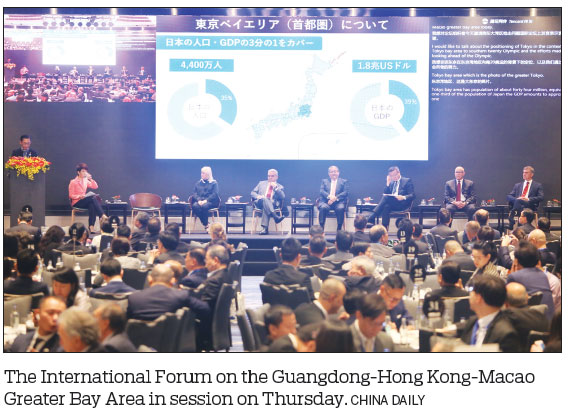City needs reform strategy to overcome difficulties: Experts
Updated: 2019-10-26 06:33
By YANG HAN in Hong Kong(HK Edition)
Hong Kong needs its own reform strategy to address the city’s deep-rooted social issues, to enhance economic competitiveness and strengthen its role in the Guangdong-Hong Kong-Macao Greater Bay Area, experts say.
“Hong Kong, in some ways, is stuck,” said Martin Jacques, senior fellow at the Department of Politics and International Studies, University of Cambridge. “Since the handover (in 1997), it has performed poorly compared with (neighboring) Guangdong province, and I think the reasons for this lie very deep in the Hong Kong economy.”
Although Hong Kong was again ranked the world’s freest economy in this year’s Index of Economic Freedom report by the Washington-based Heritage Foundation, Jacques argued there is nothing free about an economy “controlled by an oligarchy”.
“This is very different from the Chinese mainland. The Chinese mainland has got a much more competitive economy,” he said.
Jacques was speaking in Hong Kong on Thursday in a group interview during the International Forum on the Guangdong-Hong Kong-Macao Greater Bay Area. The event was co-hosted by the Hong Kong Special Administrative Region government and the Office of the Commissioner of the Ministry of Foreign Affairs of China in the HKSAR.
New growth engines needed
Echoing Jacques’ view, Zhang Weiwei, director of the Centre for China Development Model Research at Shanghai’s Fudan University, said compared with the drastic changes on the mainland, Hong Kong’s economic structure has remained relatively unchanged over the past 20 years.
“Reforms need to be taken in Hong Kong’s economic systems,” said Zhang. “It needs to create new economic growth points and more job opportunities in order to bring more hope for the youth.”
“Hong Kong is backed by the world’s largest consumer and investment market and an innovation frontier like Shenzhen. But the economy still mostly relies on property, finance and a little bit on service industry,” said Zhang, who believes structural changes can be made through the development of the Guangdong-Hong Kong-Macao Greater Bay Area.
Aiming to develop a world-class city cluster around southern China’s Pearl River Delta region, the Bay Area comprises nine cities in Guangdong province and the two special administrative regions of Hong Kong and Macao.
The Bay Area is one of the most open and vibrant regions in China. With less than 5 percent of China’s total population, the area contributes around 12 percent of the national GDP.
The development plan for the Bay Area, unveiled in February, shows the central government aims for Hong Kong to further prosper, but it will be difficult for the city to fully utilize it without structural reforms, said Zhang.
Hong Kong has maintained an executive-led governance system, with a lot of successful experience to share, said Zhang. But the power of the SAR government has been weakened over time for various reasons. This may hinder Hong Kong’s development as it makes it difficult to carry out reforms, he added.
“This is the issue Hong Kong is facing today and, to a large extent, Hong Kong people need to solve this themselves,” said Zhang.
Jacques, who also believes the Bay Area will offers great opportunities for the city, said Hong Kong needs to adopt a serious reform strategy.
“There was a feeling of going carefully, slowly, not rushing things, and so on. But, you know, it’s 22 years now (since Hong Kong’s return to China),” he said.
Noting a sense of reluctance for Hong Kong to become more integrated with the southern Chinese mainland economy among some people, Jacques said this has been “a big mistake”. Because compared with Hong Kong, the Bay Area is much more dynamic and expansionary, he added.
Instead of looking inward and to the past, Jacques said the people of Hong Kong, especially the young, should look outward and embrace the future.
Gateway status remains
John Ross, London’s former director of economic and business policy, told China Daily that fundamental factors driving Hong Kong’s future development will not be affected by the social unrest as the city will remain part of China.
Hong Kong is a gateway to China and therefore it will have the advantage of being the contact with the Chinese mainland market, said Ross, who is also a senior fellow at the Chongyang Institute for Financial Studies at Renmin University of China.
“We hope that Hong Kong will continue to be a center of international trade,” said Joan M. McEntee, former United States undersecretary of commerce.
Seeing many opportunities for the city to continue to attract trade and foreign investment, McEntee said she was confident and hopeful about Hong Kong’s future, especially given the city’s positive role as an integral part of the Bay Area.
kelly@chinadailyapac.com
(HK Edition 10/26/2019 page2)

